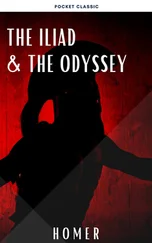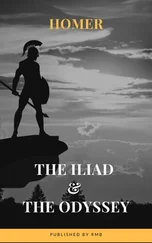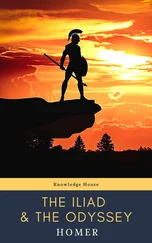John Milton - The Epic Poems Anthology - The Iliad, The Odyssey, The Aeneid, The Divine Comedy...
Здесь есть возможность читать онлайн «John Milton - The Epic Poems Anthology - The Iliad, The Odyssey, The Aeneid, The Divine Comedy...» — ознакомительный отрывок электронной книги совершенно бесплатно, а после прочтения отрывка купить полную версию. В некоторых случаях можно слушать аудио, скачать через торрент в формате fb2 и присутствует краткое содержание. Жанр: unrecognised, на английском языке. Описание произведения, (предисловие) а так же отзывы посетителей доступны на портале библиотеки ЛибКат.
- Название:The Epic Poems Anthology : The Iliad, The Odyssey, The Aeneid, The Divine Comedy...
- Автор:
- Жанр:
- Год:неизвестен
- ISBN:нет данных
- Рейтинг книги:4 / 5. Голосов: 1
-
Избранное:Добавить в избранное
- Отзывы:
-
Ваша оценка:
- 80
- 1
- 2
- 3
- 4
- 5
The Epic Poems Anthology : The Iliad, The Odyssey, The Aeneid, The Divine Comedy...: краткое содержание, описание и аннотация
Предлагаем к чтению аннотацию, описание, краткое содержание или предисловие (зависит от того, что написал сам автор книги «The Epic Poems Anthology : The Iliad, The Odyssey, The Aeneid, The Divine Comedy...»). Если вы не нашли необходимую информацию о книге — напишите в комментариях, мы постараемся отыскать её.
This collection includes:
–The Iliad and The Odyssey by Homer
–The Aeneid, by Virgil
–The Divine Comedy, by Dante Alighieri
–Venus and Adonis, by William Shakespeare
–Paradise Lost and Paradise Regained, by John Milton
The Epic Poems Anthology : The Iliad, The Odyssey, The Aeneid, The Divine Comedy... — читать онлайн ознакомительный отрывок
Ниже представлен текст книги, разбитый по страницам. Система сохранения места последней прочитанной страницы, позволяет с удобством читать онлайн бесплатно книгу «The Epic Poems Anthology : The Iliad, The Odyssey, The Aeneid, The Divine Comedy...», без необходимости каждый раз заново искать на чём Вы остановились. Поставьте закладку, и сможете в любой момент перейти на страницу, на которой закончили чтение.
Интервал:
Закладка:
Then surely the Argives would have returned after a fashion that was not fated. But Juno said to Minerva, “Alas, daughter of aegis-bearing Jove, unweariable, shall the Argives fly home to their own land over the broad sea, and leave Priam and the Trojans the glory of still keeping Helen, for whose sake so many of the Achaeans have died at Troy, far from their homes? Go about at once among the host, and speak fairly to them, man by man, that they draw not their ships into the sea.”
Minerva was not slack to do her bidding. Down she darted from the topmost summits of Olympus, and in a moment she was at the ships of the Achaeans. There she found Ulysses, peer of Jove in counsel, standing alone. He had not as yet laid a hand upon his ship, for he was grieved and sorry; so she went close up to him and said, “Ulysses, noble son of Laertes, are you going to fling yourselves into your ships and be off home to your own land in this way? Will you leave Priam and the Trojans the glory of still keeping Helen, for whose sake so many of the Achaeans have died at Troy, far from their homes? Go about at once among the host, and speak fairly to them, man by man, that they draw not their ships into the sea.”
Ulysses knew the voice as that of the goddess: he flung his cloak from him and set off to run. His servant Eurybates, a man of Ithaca, who waited on him, took charge of the cloak, whereon Ulysses went straight up to Agamemnon and received from him his ancestral, imperishable staff. With this he went about among the ships of the Achaeans.
Whenever he met a king or chieftain, he stood by him and spoke him fairly. “Sir,” said he, “this flight is cowardly and unworthy. Stand to your post, and bid your people also keep their places. You do not yet know the full mind of Agamemnon; he was sounding us, and ere long will visit the Achaeans with his displeasure. We were not all of us at the council to hear what he then said; see to it lest he be angry and do us a mischief; for the pride of kings is great, and the hand of Jove is with them.”
But when he came across any common man who was making a noise, he struck him with his staff and rebuked him, saying, “Sirrah, hold your peace, and listen to better men than yourself. You are a coward and no soldier; you are nobody either in fight or council; we cannot all be kings; it is not well that there should be many masters; one man must be supreme—one king to whom the son of scheming Saturn has given the sceptre of sovereignty over you all.”
Thus masterfully did he go about among the host, and the people hurried back to the council from their tents and ships with a sound as the thunder of surf when it comes crashing down upon the shore, and all the sea is in an uproar.
The rest now took their seats and kept to their own several places, but Thersites still went on wagging his unbridled tongue—a man of many words, and those unseemly; a monger of sedition, a railer against all who were in authority, who cared not what he said, so that he might set the Achaeans in a laugh. He was the ugliest man of all those that came before Troy—bandy-legged, lame of one foot, with his two shoulders rounded and hunched over his chest. His head ran up to a point, but there was little hair on the top of it. Achilles and Ulysses hated him worst of all, for it was with them that he was most wont to wrangle; now, however, with a shrill squeaky voice he began heaping his abuse on Agamemnon. The Achaeans were angry and disgusted, yet none the less he kept on brawling and bawling at the son of Atreus.
“Agamemnon,” he cried, “what ails you now, and what more do you want? Your tents are filled with bronze and with fair women, for whenever we take a town we give you the pick of them. Would you have yet more gold, which some Trojan is to give you as a ransom for his son, when I or another Achaean has taken him prisoner? or is it some young girl to hide and lie with? It is not well that you, the ruler of the Achaeans, should bring them into such misery. Weakling cowards, women rather than men, let us sail home, and leave this fellow here at Troy to stew in his own meeds of honour, and discover whether we were of any service to him or no. Achilles is a much better man than he is, and see how he has treated him—robbing him of his prize and keeping it himself. Achilles takes it meekly and shows no fight; if he did, son of Atreus, you would never again insult him.”
Thus railed Thersites, but Ulysses at once went up to him and rebuked him sternly. “Check your glib tongue, Thersites,” said be, “and babble not a word further. Chide not with princes when you have none to back you. There is no viler creature come before Troy with the sons of Atreus. Drop this chatter about kings, and neither revile them nor keep harping about going home. We do not yet know how things are going to be, nor whether the Achaeans are to return with good success or evil. How dare you gibe at Agamemnon because the Danaans have awarded him so many prizes? I tell you, therefore—and it shall surely be—that if I again catch you talking such nonsense, I will either forfeit my own head and be no more called father of Telemachus, or I will take you, strip you stark naked, and whip you out of the assembly till you go blubbering back to the ships.”
On this he beat him with his staff about the back and shoulders till he dropped and fell a-weeping. The golden sceptre raised a bloody weal on his back, so he sat down frightened and in pain, looking foolish as he wiped the tears from his eyes. The people were sorry for him, yet they laughed heartily, and one would turn to his neighbour saying, “Ulysses has done many a good thing ere now in fight and council, but he never did the Argives a better turn than when he stopped this fellow’s mouth from prating further. He will give the kings no more of his insolence.”
Thus said the people. Then Ulysses rose, sceptre in hand, and Minerva in the likeness of a herald bade the people be still, that those who were far off might hear him and consider his council. He therefore with all sincerity and goodwill addressed them thus:—
“King Agamemnon, the Achaeans are for making you a by-word among all mankind. They forget the promise they made you when they set out from Argos, that you should not return till you had sacked the town of Troy, and, like children or widowed women, they murmur and would set off homeward. True it is that they have had toil enough to be disheartened. A man chafes at having to stay away from his wife even for a single month, when he is on shipboard, at the mercy of wind and sea, but it is now nine long years that we have been kept here; I cannot, therefore, blame the Achaeans if they turn restive; still we shall be shamed if we go home empty after so long a stay—therefore, my friends, be patient yet a little longer that we may learn whether the prophesyings of Calchas were false or true.
“All who have not since perished must remember as though it were yesterday or the day before, how the ships of the Achaeans were detained in Aulis when we were on our way hither to make war on Priam and the Trojans. We were ranged round about a fountain offering hecatombs to the gods upon their holy altars, and there was a fine plane-tree from beneath which there welled a stream of pure water. Then we saw a prodigy; for Jove sent a fearful serpent out of the ground, with blood-red stains upon its back, and it darted from under the altar on to the plane-tree. Now there was a brood of young sparrows, quite small, upon the topmost bough, peeping out from under the leaves, eight in all, and their mother that hatched them made nine. The serpent ate the poor cheeping things, while the old bird flew about lamenting her little ones; but the serpent threw his coils about her and caught her by the wing as she was screaming. Then, when he had eaten both the sparrow and her young, the god who had sent him made him become a sign; for the son of scheming Saturn turned him into stone, and we stood there wondering at that which had come to pass. Seeing, then, that such a fearful portent had broken in upon our hecatombs, Calchas forthwith declared to us the oracles of heaven. ‘Why, Achaeans,’ said he, ‘are you thus speechless? Jove has sent us this sign, long in coming, and long ere it be fulfilled, though its fame shall last for ever. As the serpent ate the eight fledglings and the sparrow that hatched them, which makes nine, so shall we fight nine years at Troy, but in the tenth shall take the town.’ This was what he said, and now it is all coming true. Stay here, therefore, all of you, till we take the city of Priam.”
Читать дальшеИнтервал:
Закладка:
Похожие книги на «The Epic Poems Anthology : The Iliad, The Odyssey, The Aeneid, The Divine Comedy...»
Представляем Вашему вниманию похожие книги на «The Epic Poems Anthology : The Iliad, The Odyssey, The Aeneid, The Divine Comedy...» списком для выбора. Мы отобрали схожую по названию и смыслу литературу в надежде предоставить читателям больше вариантов отыскать новые, интересные, ещё непрочитанные произведения.
Обсуждение, отзывы о книге «The Epic Poems Anthology : The Iliad, The Odyssey, The Aeneid, The Divine Comedy...» и просто собственные мнения читателей. Оставьте ваши комментарии, напишите, что Вы думаете о произведении, его смысле или главных героях. Укажите что конкретно понравилось, а что нет, и почему Вы так считаете.












